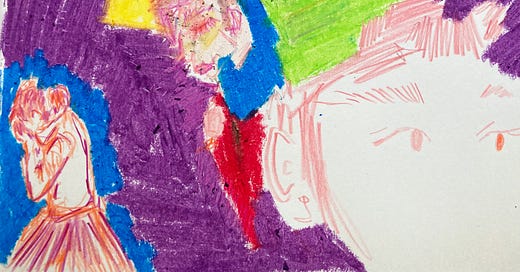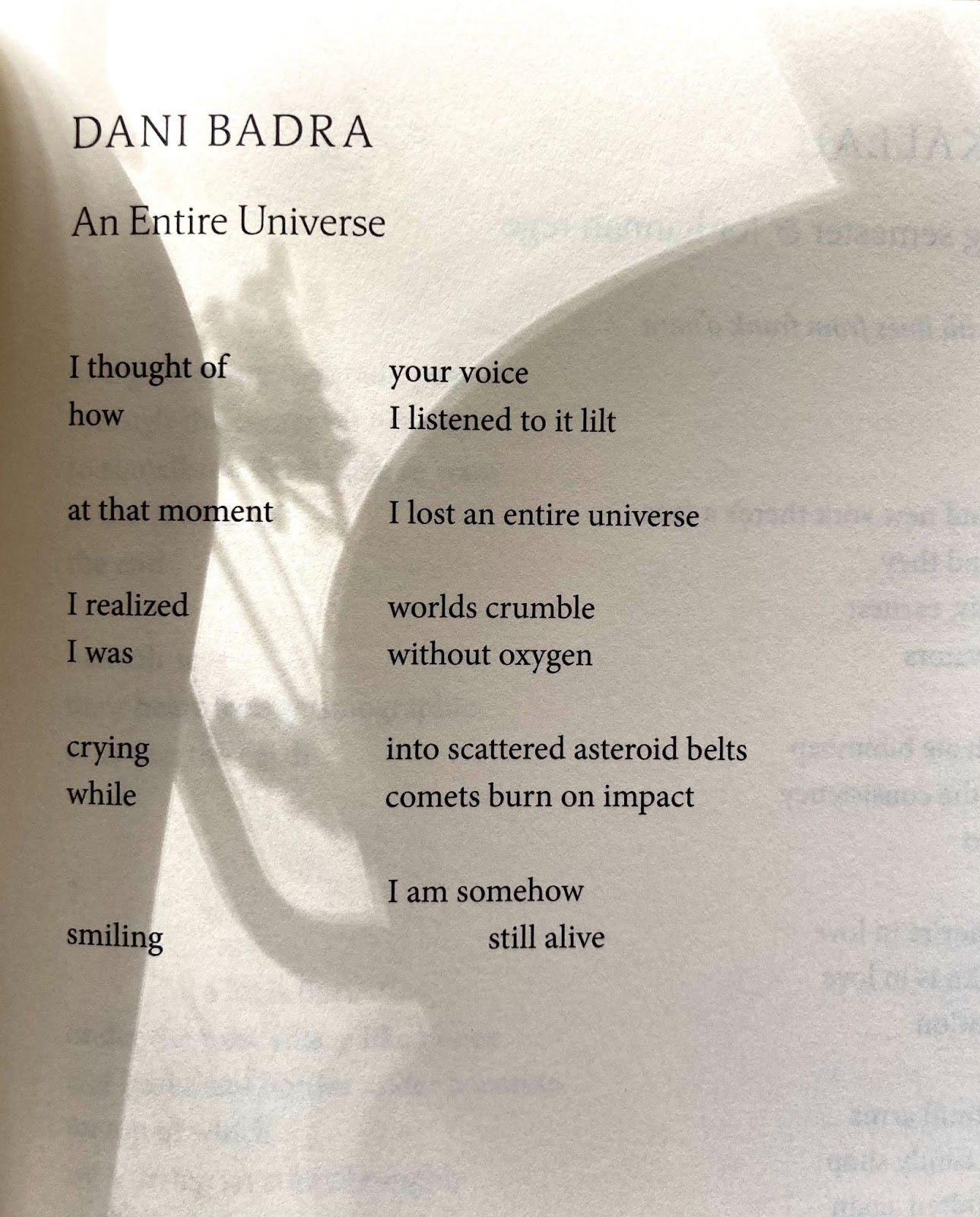[we are] a story of eyes
I didn’t know and nobody told me and what
could I do or say, anyway? —the first line from a poem by June Jordan in 2005 titled, Apologies to All the People in Lebanon
Today is September 23rd, 2024, and from a cafe on the other side of the world, I am able to see Instagram stories from Lebanon. Headlines here say nothing of the truth, nothing about the screams I hear from my phone, nor the fear instilled in the hearts of the families abroad, who are calling and writing their loved ones, repeatedly, to ask them if they are still alive.
That we can see the truth, and that this truth isn’t reflected in our day to day interactions is a second layer of hell none of us should have the ability to comprehend. We become the dysfunction, and the hope, within this frayed gap.
Every act of harm requires a prefix to counter it. And every word of care requires a prefix to fall away to make it whole again. To affix, or to remove these pieces from one another, is the larger act of doing what has been undone, destroyed, or implemented into being. What are we doing to interrupt this harm?1
writes, injustice lives in darkness, but so does god, where the veil is thin between light and dark. When we meet injustice, in darkness, we may also come upon, or turn to, the sacred. Its realm. How are we meant to tread in such a place? How do we meet it? \ with our whole—[and,] fragmented \ hearts. [?]how will you carry the remembering of this 𝄐 is an old question
imagine ways, of [ what ] & how to—interrupt / & to care is to trespass on their lies, and to trespass is [ , or , will become, for you, ] another word for love, and love will scare you
turn to coffee | you see [unspeakable] (say it) your friend asks/ but how close are you to [what] ? someone close to you is weeping on the couch isthatcloseenough
turn to the tree outside the door, she listens, she knows, she’s known your whole life
:||
This injustice is generational. It has traveled from body to body, leaves my father with half his language. Bubbles up from an almost forgotten spring. But the moon, she too is generational. She spends our whole lives, our mother’s lives, our grandmother’s lives, watching as the love returns to earth just after it’s asked to depart. The moon, like injustice, like hope, was born in shadow. There are times when only half of the world can see her. Neither this, nor her changing shape make her any less real.
My sweaty hands on a keyboard are shaking again today, September 27th, 2024. Bodies in Dahieh, Beirut have evaporated, so not even in death can they be counted. Céline Semaan writes that her mother was near the explosion. “She was driving away mortified.”
A few days ago, I reached out to a relative of mine to check in. We’ve never met in person, but he leaves me voice notes, and I know his voice. The first time I hear it, I feel I’ve always known it, or, maybe it’s that I’ve heard a similar voice before. He lives in Montreal now. His grandparents, his aunts, and cousins live in Beirut. He said they were okay.
Last year, I wrote something titled, A poem for the Arabic language that has yet to make a home in my mouth. Something about birds and how they feed their babies, softening first, before the throat of another. And what does this mouth do to make a home for a language whose ancestral home is burning? I learn from reading A Private Ocean that qamus, in Arabic, means dictionary. And that qamus has a second, and older meaning: ocean. An older knowing, an older water that bleeds meaning with other meaning, sooner opening its roots to a mysterious, deep unknown than caught in the trouble of trying to define things with pen and paper.
Today is September 30th, and I spoke with my relative in Montreal again. This time we see each others faces, and this makes us smile a lot; it’s our first time to do a video call. He says his family can see the smoke from the bombing. They can hear the sounds of the bombs. “But they are okay.” He sends me some of his art, which he calls “astrophotography.” There are three photos of the night sky. Some stars are still, and some stars are moving over long periods of time to create a blur, or, a line of travel. He asks about doing a collaboration, we decide I might paint on these photos, or we may overlay my photos with his. Two stories held in one place.
On August 2nd, I woke up and couldn’t see out of my left eye. I reached for my phone, of all things, to check—to gauge just how blurry things really were. When I blinked, not much changed. With my right eye I could see the time, and the messages. With my left, there were only colors—Shapes—but even those were joining together as one. Mosaic. I had just bought a journal with an embroidered eye on its cover, this detail hasn’t left my mind.
A family friend, who lives down the road, is also fighting to see out of his left eye. We are a story of eyes. The other day, my mom and I stopped by their house, and we commiserated. Like mirrors. It felt like the first time I could really laugh about something that presented itself with such fear. He drew an eye on the card he sent to the house to say thank you, it sits on our table. My eye is healing, and I hope his does too.
Almost three weeks ago, Lebanese photographer and artist, Myriam Boulos, shared a story about the device explosions in Lebanon that read:
500 people lost their eyes
Their eyes
\
Today is Sunday, September 29th, and there is more news on my phone. I see reports of Israeli bombings in Ein al-Dilib, Saida. I recently learned that Saida might have been the home of my great-grandfather. That’s what Ellis Island has written on his certificate. Family stories tell of his home \ of mountains—
I saw a poem by Dani Badra circulating online earlier, only to realize I’d seen it before, that it lived inside a book I bought months ago, titled, We Call to the Eye & the Night, Love Poems by Writers of Arab Heritage edited by
and Zeina Hashem Beck. The introduction to this collection stills the heart of desperation, any old impulse to have to perform identity in an effort to have something—like self, or expression—read by an audience, particularly a western one. The end of the second paragraph reads, “We begin beyond the need to subvert or explain. We begin with: here is a book about love.”[ September 23rd, 2024 ] This morning I was with a body of water. The lake here is unwell, and it’s likely part of the reason why my eye became unwell. There’s a sign on the other side that reads, How to protect our waters from our own home. There are three steps to follow. My phone cries out, carries a story from across the ocean—more destruction. It arrives here, is here. But it is not violence that demands to be seen. What demands to be seen is your heart, breaking again.
At the doctor’s office, in the middle of August, I saw the black and white photos of my left eye: its inner composition, a map. It caught my breath because it looked like stars, clusters of them. I could lose my eye, I knew. All was silent except for the crescendo and decrescendo of an ambulance outside. Something wild rustled, rising in my throat, placing me exactly where I was. There were several doctors in one room, some of them students; I, too, a student of myself.
at the doctor’s office, i saw black and white photos of the stars, my eye—its constellations: i saw entire worlds, generations of forgetting, and generations of remembering, inside it
I didn’t know and nobody told me and what could I do or say, anyway?
—the first line from a poem by June Jordan in 2005 titled, Apologies to All the People in Lebanon
Watch / See / Listen / Read:
++ Consider watching this video to (un)learn and understand more about this last year. Watch with care and intention here.
++ A video of migrant workers in Lebanon who escaped to Ramlet El Bayda
++ A Rupture in Time by Sarah Aziza
++ “We are also forever changed: Our eyes wide open, primed to distrust media, social, and political authorities bullying us into becoming walking zombies obsessed with pop culture distractions, wide open to the fact that imperialism shapes the minute details of our daily lives, to the fact that Zionism is racism and that a free Palestine has the potential to set us all free.” — Nothing Will Ever Be the Same Again by Noura Erakat
Donations:
Urgent Call for donations for my friend, Salama, and his family in Northern Gaza ; PayPal link here & GoFundMe link here. Note that Salama will receive the funds quicker if you donate via PayPal.
~ donate to Salama & his family via PayPal here ~ PayPal is faster ~
~ donate to Salama and his family via GoFundMe here
~ donate to Salama’s clean water project for his community in Northern Gaza here
Yesterday, I received a message from Salama saying he won’t be able to reply to messages. His situation has been urgent all year. However, yesterday the Israeli army invaded Salama’s area in Northern Gaza. His story on IG shows and explains that he and his family are hiding, and that they are looking for arrangements to flee/escape. Note that funds are transferred to Salama and his family faster using PayPal.
+ Mutual Aid efforts for migrant workers and vulnerable communities in Beirut
+ For Gaza Evacuation & Living Expenses (GFM campaign list) *Note that at this time it is almost impossible to evacuate Gaza. Families and individuals need funds for living expenses in dire circumstances.*
+ Where to donate for Lebanon (doc)
+ For displaced individuals in Southern Lebanon — Beirut Art Center
+ Call for relief fund — found via Mizna Arab Art & Slow Factory
+ Mutual aid for displaced families in Lebanon
Accounts to follow:
Salama Al ladaa - Salama and his family are in urgent need of funds. As mentioned above, Salama (or, Simo), is a displaced Palestinian living in Northern Gaza. Consider donating to his PayPal (PayPal is faster) or GoFundMe to support his family of 13 members, and his community of 55.
Hanin Siam <3 - Gaza-born Palestinian living in Japan
Céline Semaan - Lebanese-Canadian Designer & Founder of Slow Factory
Noura Erakat - Palestinian-American Human Rights Attorney
Myriam Boulos - Lebanese Photographer & Artist in Beirut
Sara El-Yafi - Lebanese Public Policy Expert
Hala Alyan - Palestinian-American Writer & Poet
Sama Beydoun - Lebanese Designer & Artist in Beirut
Zeina Hashem Beck - Lebanese Poet
“interrupted harm” is something I learned from Hala Alyan’s essay, Opinion: Do campus protests show Americans’ support for Palestinians has reached a turning point? —The L.A.Times.






